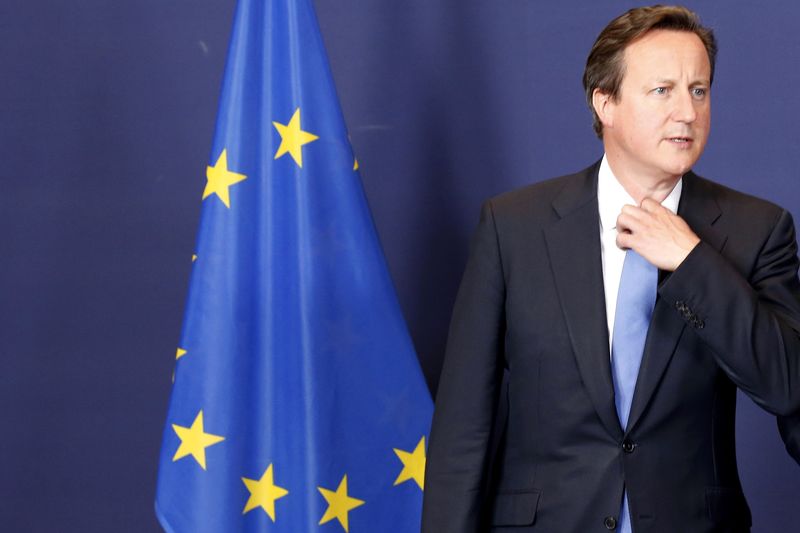By Michael Holden
LONDON (Reuters) - To predict the result of Britain's upcoming referendum on European Union membership you might do well to ignore the opinion polls and watch what the gamblers are doing instead.
The fact that pollsters failed to call last year's national election winner while gamblers won big has given an additional twist to the knife-edge EU vote.
Political betting has become a serious business in recent years for Britain's 6.3-billion-pound ($8.9-billion) gambling industry, and about 100 million pounds was estimated to have been staked on the outcome of last year's national election.
For months up until the very last moment, polls indicated that the May election would result in a hung parliament with the two major parties securing a similar number of seats.
Instead, Prime Minister David Cameron's Conservative party secured victory with a comfortable, albeit slim, majority the psephologists who study voting trends had failed to predict.
It was not just pollsters who got it wrong. Bookmakers seriously lost out as their punters correctly called the result.
"We lost an awful lot of money on the general election last year and that was because we relied too much on the polls," Matthew Shaddick, Head of Political Odds at bookmaker Ladbrokes (L:LAD), told Reuters.
"We probably weren't taking enough notice of what people were betting on. Lots of people were quite happy to ignore the polls last year and bet on the Tory (Conservative) majority which looked all but impossible to people who pay a lot of attention to the polls."
A report published on Tuesday concluded that sample recruitment methods and possible unintended herd behaviour by pollsters had led to last year's fiasco which angered many in politics and the media.
Only an exit poll that jolted the political establishment on election night itself was close to being right.
The next major test for the polling companies will be the referendum on whether Britain should remain in the European Union, a vote to be held before the end of 2017.
Already there is a clear divergence between opinion polls and the betting industry. A current poll of polls has "Remain" on 51 percent and "Leave" on 49 percent while the most recent survey put the number of Britons wishing to leave the bloc at 53 percent, with 47 percent in favour of remaining.
However, bookmakers are unanimous in making the Remain camp firm favourites with nearly all offering the same odds, 2/5.
"It's almost exactly a two-thirds chance according to our clients that Britain will choose to stay in Europe," Peter Hetherington, chief executive of online brokerage IG Group, told Reuters. "That is interesting because that's actually quite diverging from the latest opinion polls which suggest it's much closer than that."
CASH DRIVES THE ODDS
So why the discrepancy?
"I think more and more people are getting more convinced that that's the way it's going to go irrespective of the fact the polls are showing it very, very close on average overall," said Ladbrokes' Shaddick.
"We spend a lot of our time looking at polls and the political science analysis of those polls. But ultimately it's the money we're taking from our customers that drives the odds more than our particular opinion."
So far, not much money has been staked on the referendum outcome - Ladbrokes says it has taken about 100,000 pounds - although the bookmakers expect that to change once Cameron has announced a date for the vote.
They expect the interest will then match that shown by gamblers during the 2014 Scottish independence vote when Scots rejected a breakaway, an outcome pollsters correctly forecast. Up to 12 million pounds was said to have been bet on the vote.
Graham Sharpe, from bookmaker William Hill, said it was no surprise pollsters got it wrong sometimes.
"If the opinion pollsters were always going to be right, we'd have been out of business long ago," he told Reuters.
"We update the odds on a regular basis depending a. on what we think, b. what money we've taken, and c. as a factor we look at the opinion polls because we are aware that some of our customers may be influenced by them as well. But they're certainly not the main factor."
The fact William Hill had lost about 500,000 pounds at the last election showed their customers did not believe the polls, he said. However, he pointed out that anyone predicting elections can get it wrong.
An unidentified man who won 193,000 pounds on a 900,000-pound bet on the result of the Scottish independence vote then lost 205,000 pounds wrongly predicting the 2015 election would see a hung parliament, William Hill said.
In the wake of their disastrous showing last year, pollsters have now promised to make changes, although the head of the inquiry into the failures said there was no silver bullet.
Shaddick said his team would be more sceptical but surveys still remained the best way of gauging public opinion.
Sharpe was less convinced. "It's always been my policy to deliberately lie to any opinion pollsters so how you factor that into the equation when they're speaking to people I really don't know," Sharpe said.
